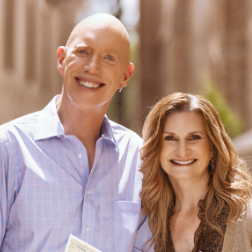Health Care for Expats
A pair of dauntless retirees who live outside the United States talk about the quality and cost of good health care abroad
According to the State Department, over 9 million Americans (excluding military personnel) reside outside the United States. That's more than the populations of Los Angeles, Chicago and Phoenix combined.
Despite this surprising statistic, many people still harbor varying degrees of trepidation about the idea of living abroad. Thirteen years ago, when we announced to our family and friends that we were moving to Ecuador, one of our relatives sarcastically asked if we were going to live in a grass hut, ride a donkey and visit a witch doctor when we got sick.

While that reaction was extreme, it illustrates a general misunderstanding of daily life in a foreign country. The availability, quality and cost of health care outside of the United States are topics we have been asked about frequently.
Medicare Abroad
For those enrolled in Medicare this subject is even more important since coverage doesn't extend beyond U.S. borders. Or does it?
The availability, quality and cost of health care outside of the United States are topics we have been asked about frequently.
Medicare Advantage plans may offer numerous benefits beyond Original Medicare. If you have this type of coverage and plan to live or travel abroad, check the Emergency Care section of your Schedule of Benefits.
Our own Advantage plan provides worldwide emergency and urgently needed services with a $125 copay and $50,000 maximum plan coverage.
No matter what, we strongly advise maintaining your Medicare health insurance when you relocate abroad. We've seen many expats who were "sure" their move was permanent but later decided to return to the U.S. for a variety of unforeseen reasons. Opting out and reapplying for Medicare is time-consuming and expensive.
Some Perspective
Here is an eye opener. According to the latest RCG Global Health Index, almost every popular expat destination, including Ecuador, ranks higher than the #74 spot received by the United States. Modern hospitals and clinics with state-of-the-art equipment are available in major cities throughout the world. As in the U.S., the level of service decreases the farther you are from large metropolitan areas.
Our hometown of Cuenca, Ecuador, with a population exceeding 600,000, has five hospitals, three large clinics and the third-highest-ranked medical university in the country.
Health Care Options Abroad
Choices to cover your health care needs in many countries, including Ecuador, are to pay out of pocket, sign up for private coverage or enroll in the country's national health care system once you have become a permanent resident.
We pay our dentist, dermatologist and ophthalmologist directly, office visits costing $50 or less.
Prices for treatment and medication are so low (in some cases 10% of what you're accustomed to paying) that many expats simply pay out of pocket. To encourage use of their facilities and doctors, some hospitals offer reasonably priced in-house insurance plans. Latin American health insurance companies provide a range of options. The most expensive choice is an international plan since coverage must include countries like the U.S. where costs are high.
We belong to the national plan and pay less than $90 total per month for 100% coverage with $0 deductible and no restrictions for age or pre-existing conditions.
Our experience has been very positive, but under this plan, the system chooses your doctor and wait times to see specialists can be long. We pay our dentist, dermatologist and ophthalmologist directly, office visits costing $50 or less.
Visiting the Doctor
We are shocked when family members tell us how far in advance doctor's appointments must be scheduled. For us, same-day appointments are often arranged simply by calling our doctors' personal cell phones or contacting them on Facebook.
When you arrive at a medical building, you will find a receptionist stationed on each floor. This is where you check in and make your payment. You then sit in a hallway outside the office of the doctor you are seeing until it is your turn. No clipboard with umpteen pages of personal health history to fill out.
The physician's office is usually just that — an office with an examining room and no staff. He asks, "How can I help you today?" From there your appointment takes as long as necessary. Follow-up visits for the same condition are free, and most medications can be purchased over the counter — that is, without a prescription — very inexpensively.
Going to the Hospital
Edd was having a routine wellness visit with our primary care physician in the consultation area of the hospital. He asked about the Duputren's contracture in his hand (a condition that causes one or more fingers to bend towards the palm). "Yes," the doctor said, "that needs attention. Come with me." They got up and walked to the nearby office of a hand surgeon.
The caring, unhurried mindset, and absence of excessive delays, paperwork and bureaucracy are refreshing.
"I can fix this," the specialist said. "Can you come back to the hospital at 7 a.m. tomorrow?" Tomorrow? Our doctor then immediately took Edd for X-rays and to meet with the anesthesiologist. The operation, an outpatient procedure in the States, required an overnight stay and was a complete success.
About five years ago Cynthia wasn't feeling well and suddenly fainted. In the emergency room all sorts of tests were run and after being there for several hours, the on-call physician commented, "Sorry this is taking so long but we cannot release you until we know why you lost consciousness." No problem, take your time.
No Paperwork, No Bill
Turns out she had suffered a bilateral pulmonary embolism. She was admitted to the hospital and stayed a week, receiving what our doctor described as "world-class protocol." When she was released, there was no paperwork, no bill, nada. By the way, he made a home visit to check on her a few days later. This level of personalized care continues to impress us.
While the quality of health care in other countries often compares quite favorably with the United States, the cost and approach are radically different. From insurance premiums to office visits to procedures to medications, expect to pay 10% to 25% of what you would in the U.S.
The caring, unhurried mindset, and absence of excessive delays, paperwork and bureaucracy are refreshing. Overall, we are happy to report that our experience with health care in a foreign country has been totally satisfactory.


